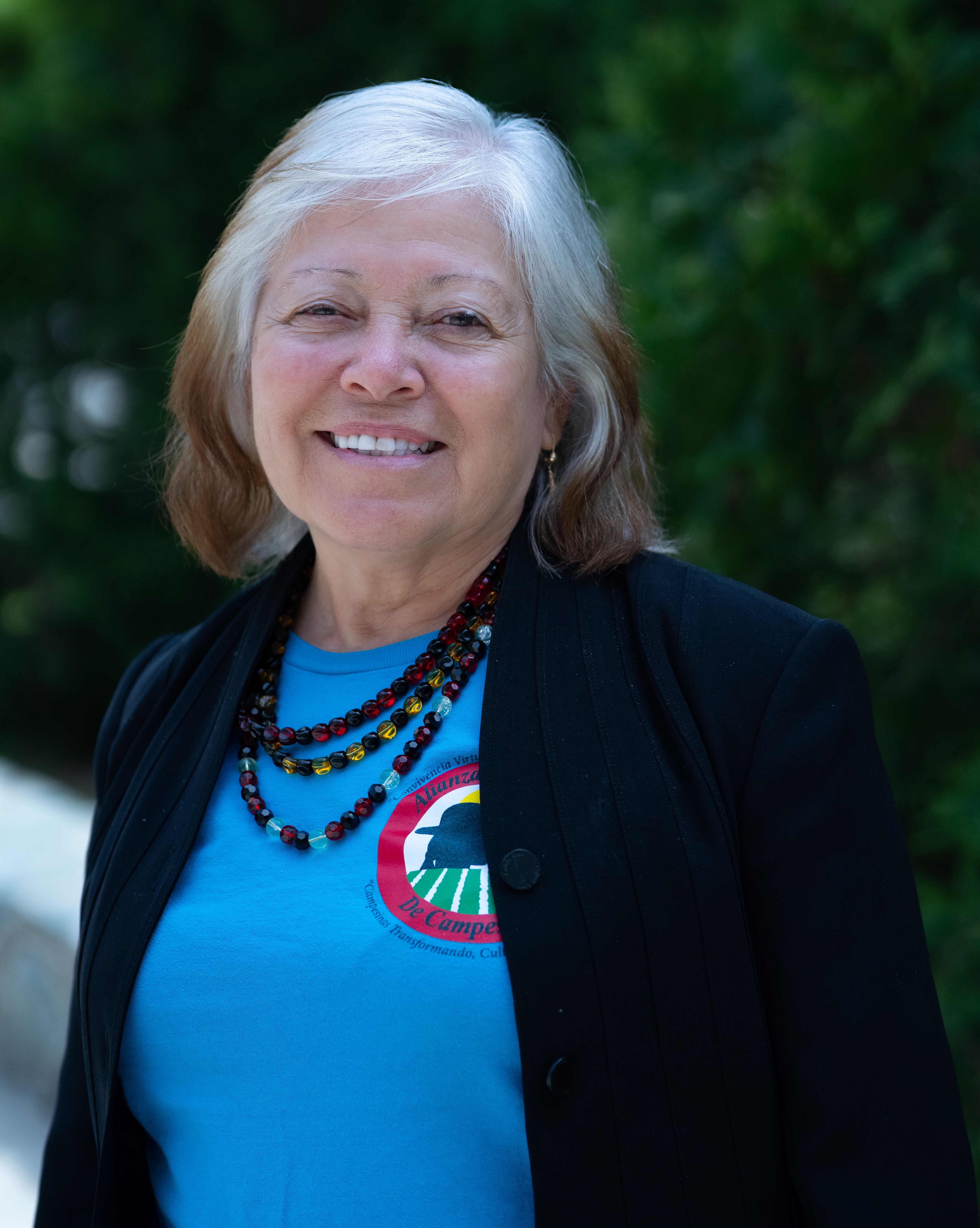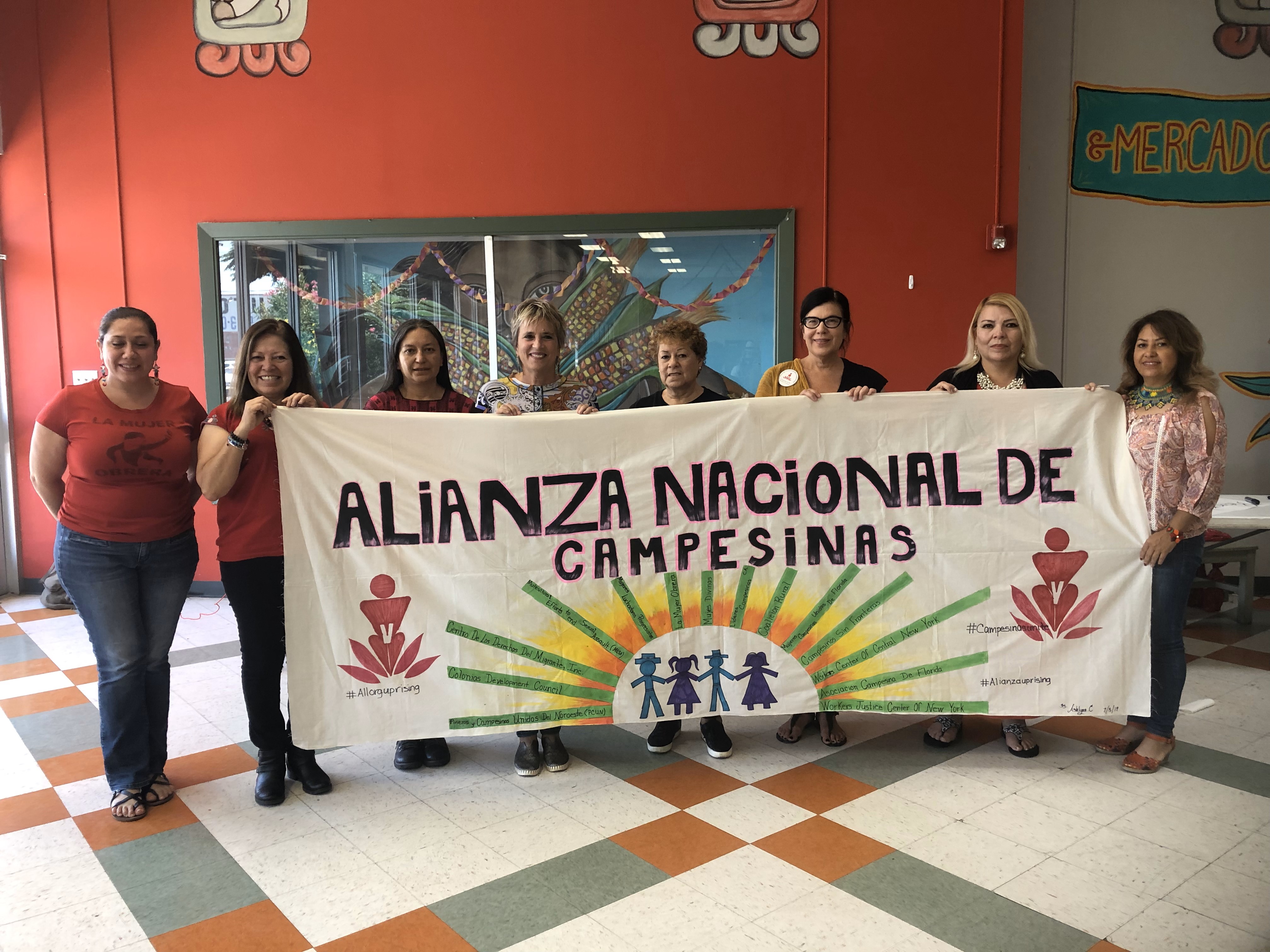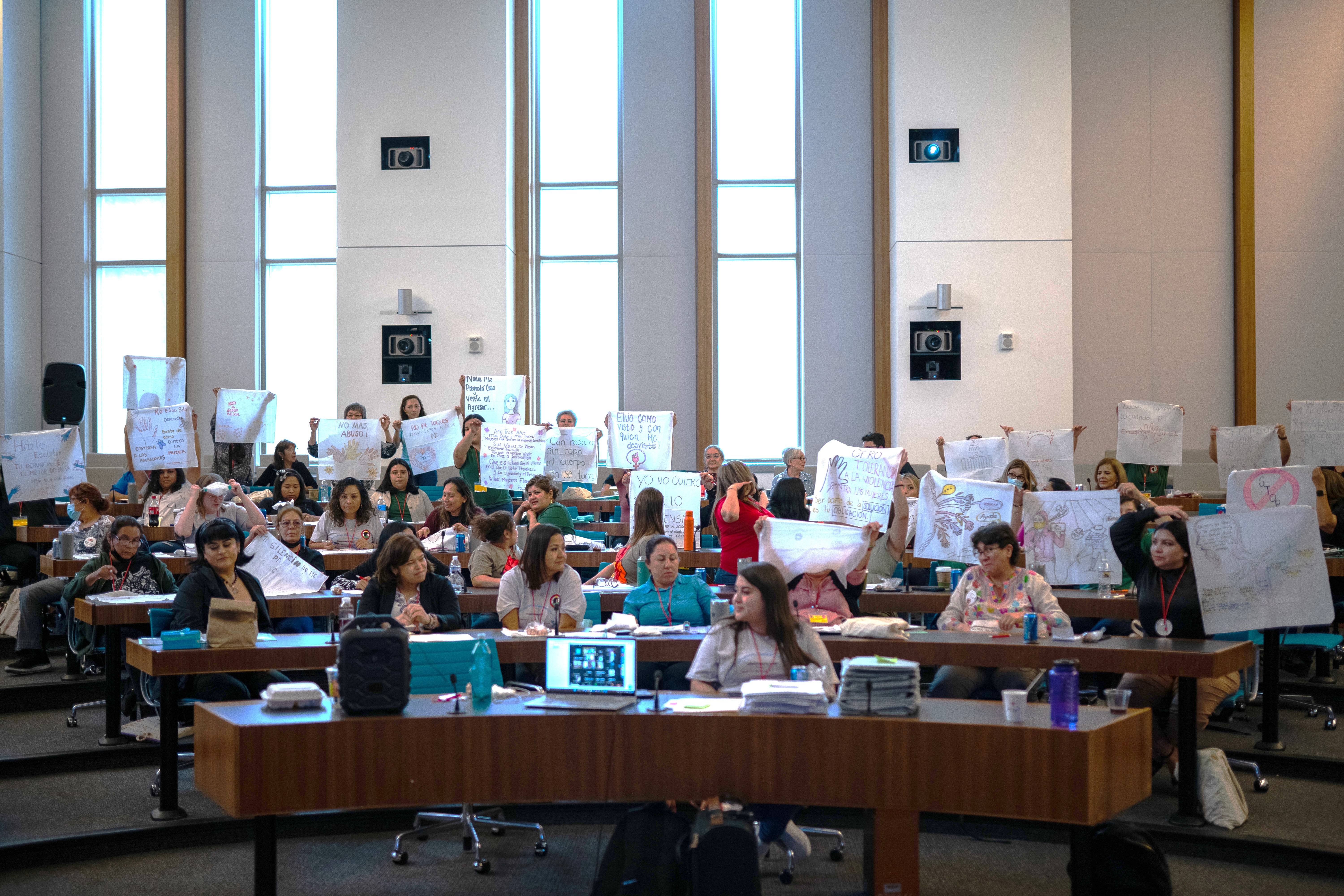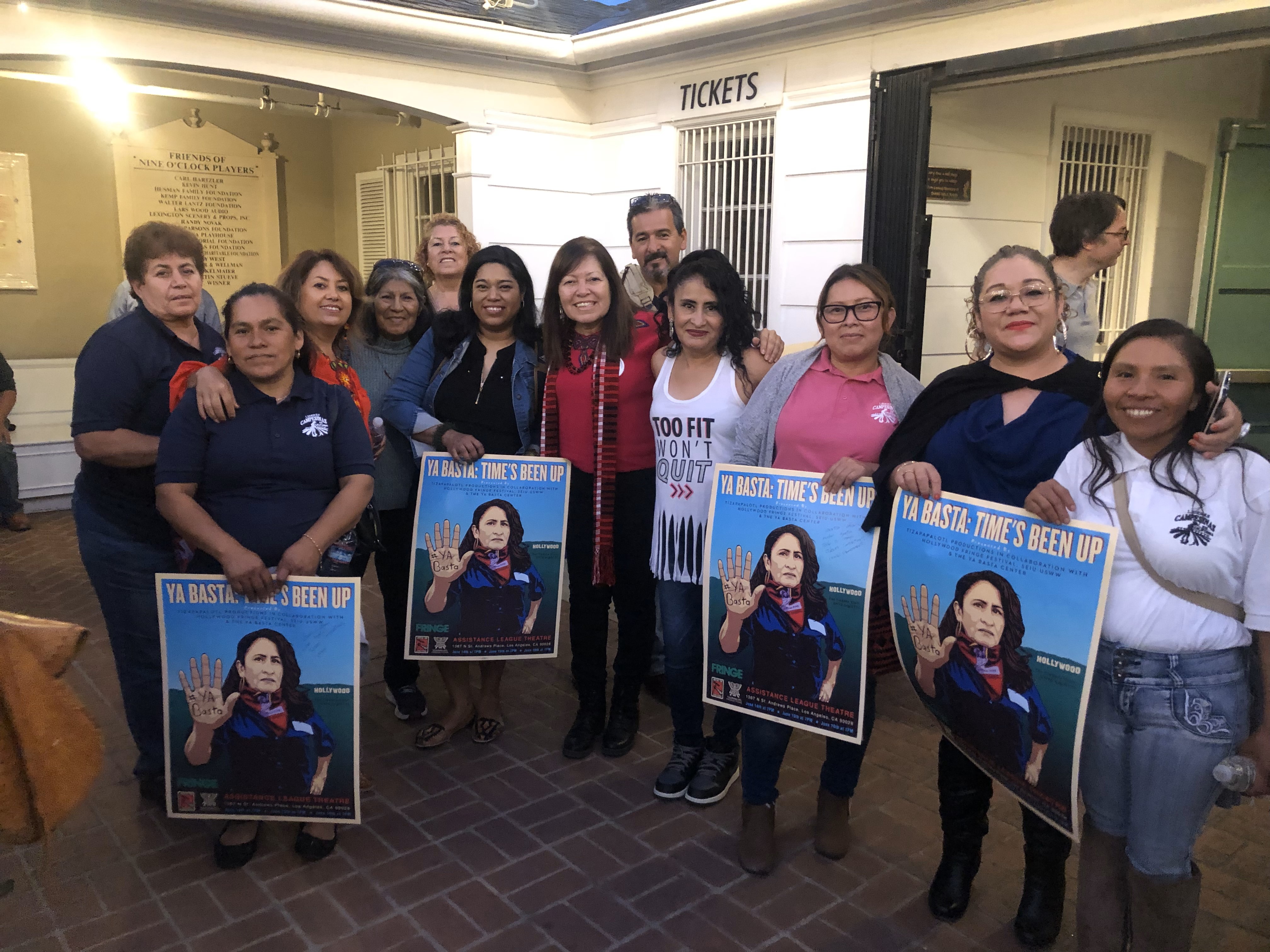Welcome to GCIR's Amplify blog series, where we feature interviews with immigrant justice field leaders to showcase their work and provide a platform for their perspectives. In this edition, GCIR President Marissa Tirona interviews Mily Treviño-Sauceda, Executive Director of Alianza Nacional de Campesinas. Read on as Mily shares how the work of farmworker women intersects with fights for migrant, gender, worker, and climate justice, and how philanthropy can support the leadership of women farmworkers.
A note to readers: This interview mentions sensitive topics that may be triggering, including sexual harassment and other violence against women. Please take care while reading this article.
To get us started, we'd love to learn more about you, your organization, and the communities that you serve.
Like all of those who helped start this movement, I come from a migrant worker family. I am one of ten siblings, some born in the U.S. and some in Mexico. Eventually – after time in Washington State and Idaho – we landed in California. In every place, in every job, every time, we learned what it means to be marginalized and vulnerable to exploitation as farmworkers, as it has been throughout history. That means wage theft, pesticide poisoning, sexual harassment, and much more.
I later learned that my mother had experienced sexual harassment on the job, which is why we moved so often when I was growing up. And it wasn’t just her –many women have experienced this, including me. I feel lucky that I have never been raped, but many women are not so fortunate. That’s why this issue in particular is so important to me – it’s personal.
When I first learned about the United Farm Workers and our rights in the workplace, I finally understood how much we had been exploited. I learned about the importance of organizing and the power of having union representation. That led me to a position at California Rural Legal Assistance, a legal services agency that hired me to help their attorneys educate workers about their rights and build trust with communities in the Coachella Valley. The first year I was there I was afraid of being fired since I had been fired many times in agricultural settngs for being so outspoken. But I ended up working with them for ten years.
While employed at CRLA, but not for the agency, I participated in research for a master's thesis where we interviewed farmworker women to get an inside look into their daily struggles. Many times I would see women come to the CRLA office with bruises that they would try to hide. They had come to the office because of other issues, like workplace discrimination or housing or health concerns, but each time I would ask myself: how else can I help her? The questionnaire created for the thesis helped us learn more about the unique challenges and needs of farmworker women and to ask them for their recommendations on how to address these problems.
From this we learned that we needed to organize together as farmworker women, which led to what eventually became Mujeres Mexicanas. After bringing women together for a series of conferences, we came up with a goal: to create a national network of farmworker women. We knew it was ambitious, but we also knew it was necessary. First, it was important to build a statewide network of campesinas in California.
It wasn’t easy at the beginning. People would tell us: “You should be home taking care of your children. Doing this will give you a bad reputation.” But we were making progress, and for us that was the most important thing. This was the beginning of what became Alianza Nacional de Campesinas, where I am now the Executive Director.
The work you do is at the intersection of gender, migrant, worker, and climate justice. How do climate issues impact your work?
Our members face a lot of health challenges, being around all these pesticides. For example, we see pregnant women who have to keep working but then lose their pregnancy or have children with special needs or deformities because of pesticide exposure. We also see high rates of cancer linked to the types of pesticides being used in the fields. As the climate warms, the life cycle of the crops changes. Because of this and many more reasons, more chemicals are being used to make the crops grow faster, contributing to the use and misuse of pesticides.
Because of rising temperatures, and the hard physical work farmworkers undergo, they are more likely to experience heat-related illnesses. This makes it difficult for farmworkers to use proper protection against pesticide exposure, as added layers of clothing and masks make it more likely that a person will experience heat stress.
We knew way before 2020 that we were essential workers, but no one called us that until Covid. They called us essential because we had no choice but to keep working, but we have never been treated as essential. If we are essential workers, why are we being sprayed? Why are we being poisoned? Why are they allowing us to get sick from the heat? Why don’t we have better laws and regulations to protect us?
What strategies have workers identified or implemented to address these issues?
In our Mother Earth project, we have women who knew how to farm before they came to this country, who know how to work the land the way our ancestors did. These women share their knowledge of medicinal plants, composting, natural pest control and disease prevention with other farmworker women. We are also partnering with Coming Clean, Earth Justice, and other national environmental justice advocacy organizations. And we are participating in various lawsuits against the Environmental Protection Agency (EPA) to address these issues.
We also have our Morralitos (satchels) Campaign, which uses art to create public awareness about the health risks of pesticide exposure for farmworker women and their families. As part of the campaign, farmworkers, their families, and community members across the country decorate, design, write messages and exhibit these small satchels to open dialogue about these issues with the people while sharing the impact of pesticides on agricultural communities along with safety and health messages.
What strategies have you found to be the most successful?
Our groups are so successful because we work within the cultural context of our communities. We use theater, we use art, and we build our work engaging women to plan together, because that's the way you open dialogue and build trust. It's easier for people to take knowledge into their communities and apply it if you are engaging within the cultural context.
As farmworker women, we’ve learned that, in order to be effective workers, activists, and organizers, we need to look at our upbringings. We were brought up to always take care of others before ourselves. As we started acknowledging ourselves, we also learned that we needed to validate each other. When women say, “I'm just a volunteer, not a leader,” some of us now ask, “What does a leader look like?” We talk about the characteristics of leadership and when the women end up describing ourselves, many more of us now say, "You see? You're a leader and an agent of change, we are all leaders." It's important to remind each other of the power we hold.
What do you need from philanthropy and how can funders better support and invest in the strategies led by farmworker women?
We need philanthropy to understand that our communities need support to build our capacity at a very basic level. Alianza Nacional de Campesinas was established in 2011, but we didn’t have enough money to hire staff until 2018. We were able to get funding to hold meetings to begin getting women involved, but what we need is enough funding to establish full infrastructure for our organizations. We don't think of our work as individual projects. We are guided by the community's needs, and then we seek funding.
There is a lot we have been able to do in California that we’d like to establish in other states, but we don’t have the funding to do that. We also see great value in creating scholarships to engage young people and help the next generation carry on the work we started. Funders also need to engage with our community leaders instead of taking over our process.
In terms of capacity, many grassroots groups don’t know how to write formal grant proposals. That is not necessarily our area of expertise. When I was organizing with Lideres Campesinas, we had outside people help us prepare proposals, and that was a big help. We knew what we wanted to say and what we needed. We were good talkers and convincers, but when it came to writing it in a formal grant, we lacked that ability.
When funders give money, they think, “We’ll give it 2-3 years.” But it can take up to ten years to establish an effective and sustainable project. The California Endowment has given to Lideres Campesinas since 1995. And they help us in terms of trying to find new funders to support the work. This is another thing philanthropy can do: if you really like our work, convince other funders to also provide support.
Earlier, you said you don’t want funders to take over your process. I would love to hear more about what you meant by that.
There have been funders who liked our work and gave us money the first year, but then they started asking us, “Can you do it this other way?” I would say, “No.” They don’t expect us to say no. But we’d say, “Give us time, and we might be able to do what you’re asking, but right now this way of doing things is working.” For example, we were told to work with farmworker women to address sexual harassment in a way that was very foreign to us, very mainstream. We said, “I don’t think so,” and we started inviting their foundation staff to see how we use theatrical skits in our trainings and how the women could take their learning to their neighborhoods and communities. The women are successful because they work within the cultural context of their community.
This helps us build trust because people from the community see that we have knowledge to share in a way that has meaning for them, and we help them see that they have their own knowledge we can help them access. We need to be supported in ways that make sense for our communities. Some outsider, or funder, may think they know better ways of doing things, but they are not familiar with our culture or how imporant it is to work within the cultural context of our community, then their plans probably won't work.
What story do you want to tell in the next five to ten years about what your organization and movement has accomplished?
I hope we will have filed several lawsuits that led to better regulations and laws to protect farmworkers, including which pesticides are allowed and how much is allowed to be sprayed. I would like to say that we trained as many women as possible, and that we trained more youth and engaged them more deeply. I would like to see that young people helped us develop new projects and helped women who didn’t know how to use technology develop those skills. I want us to be actively working to prepare the next generation to carry out this work.
Right now, my successor at Lideres Campesinas is doing three times more than I ever imagined I could do. She’s my son’s age, and she started as an administrative assistant and then – because she was so eager to learn – we trained her, and now she’s training other women.
I will tell you, the changes we have seen with our women farmworkers since 1988 is incredible. Women that, back then, wouldn’t even work outside the home, now they’re traveling not only within the U.S. but outside the country representing our work and training other women.








